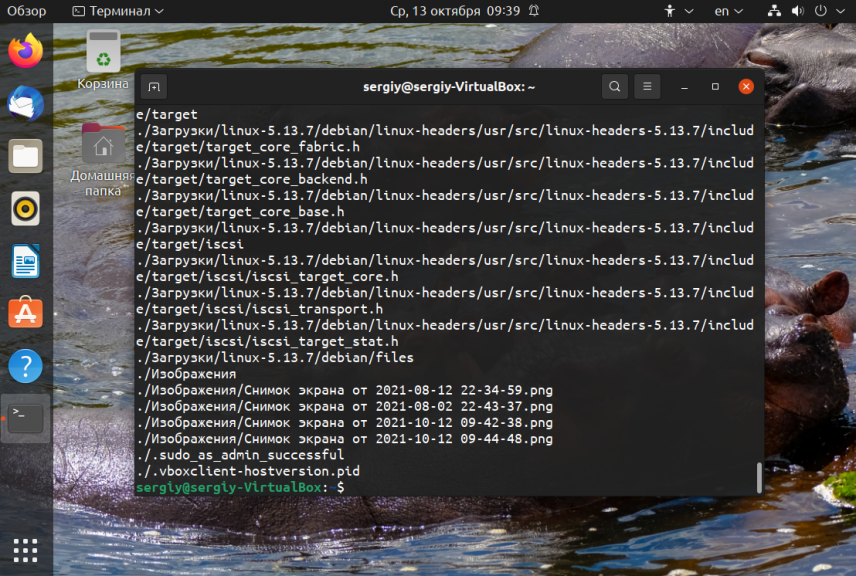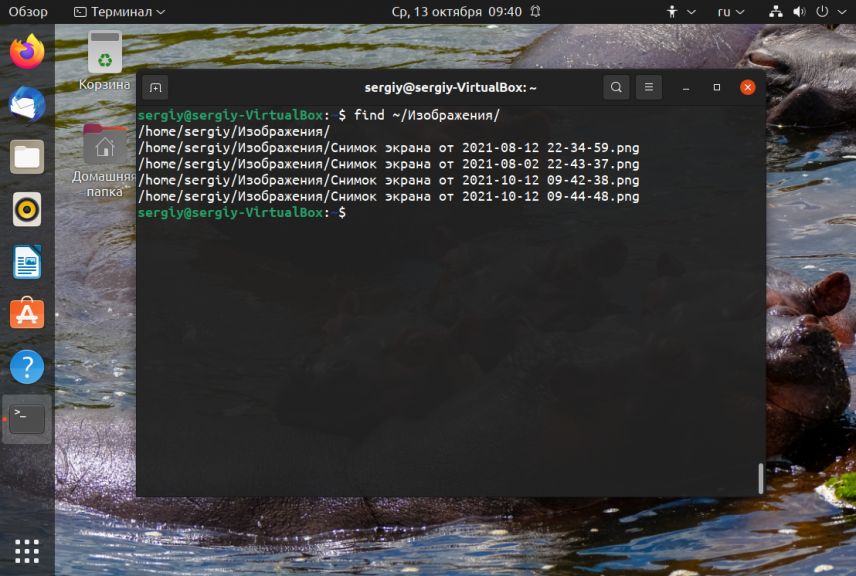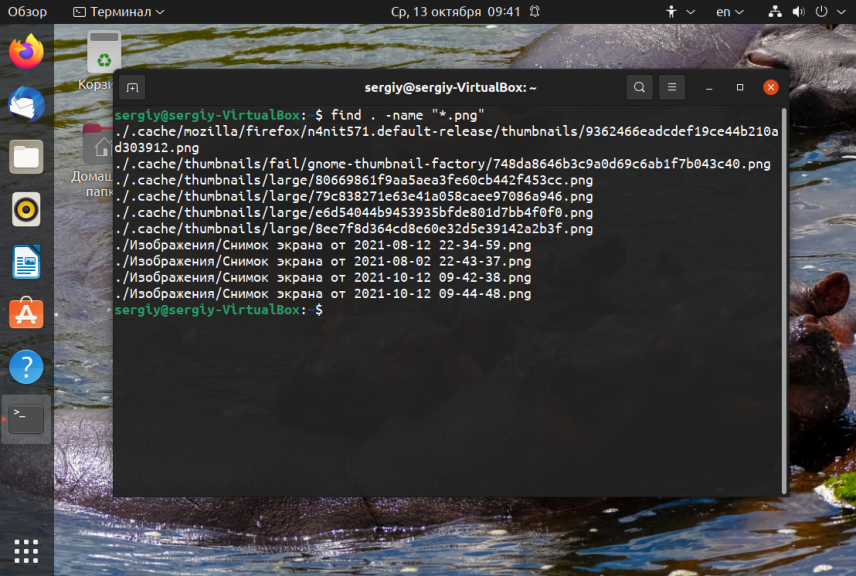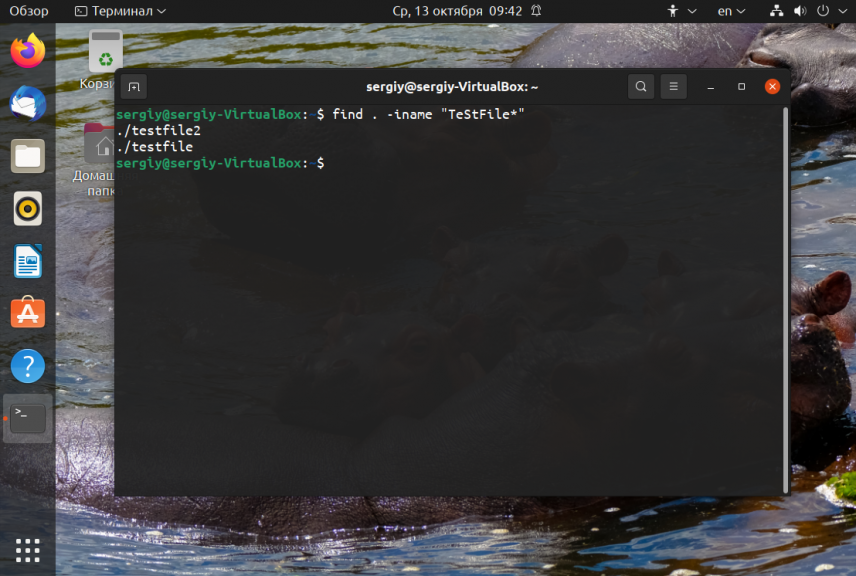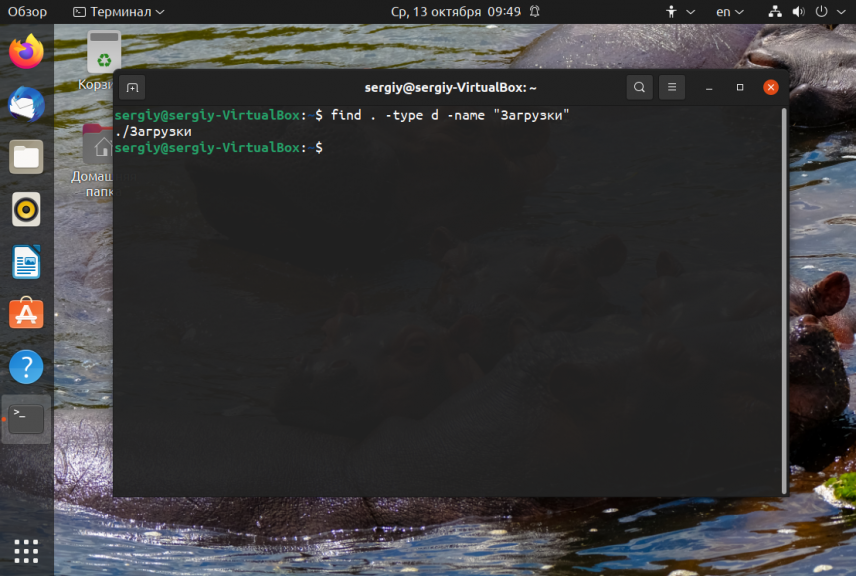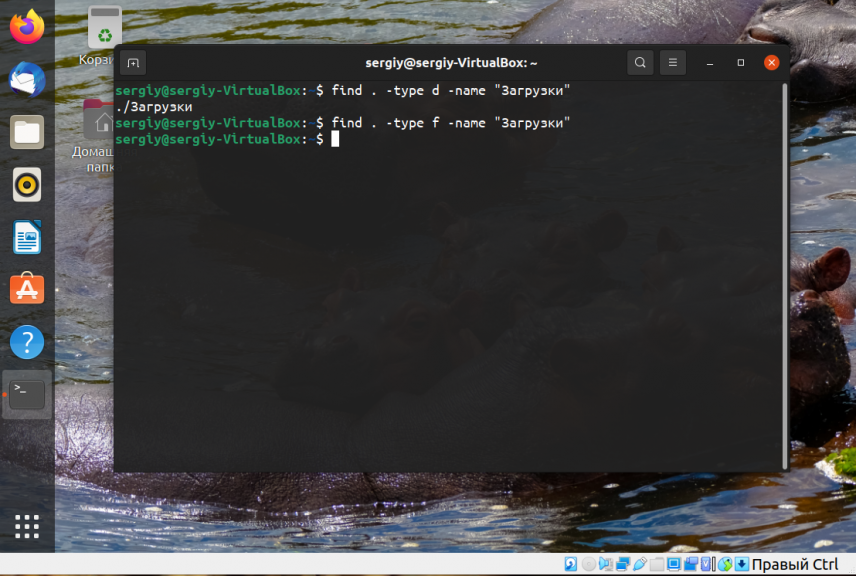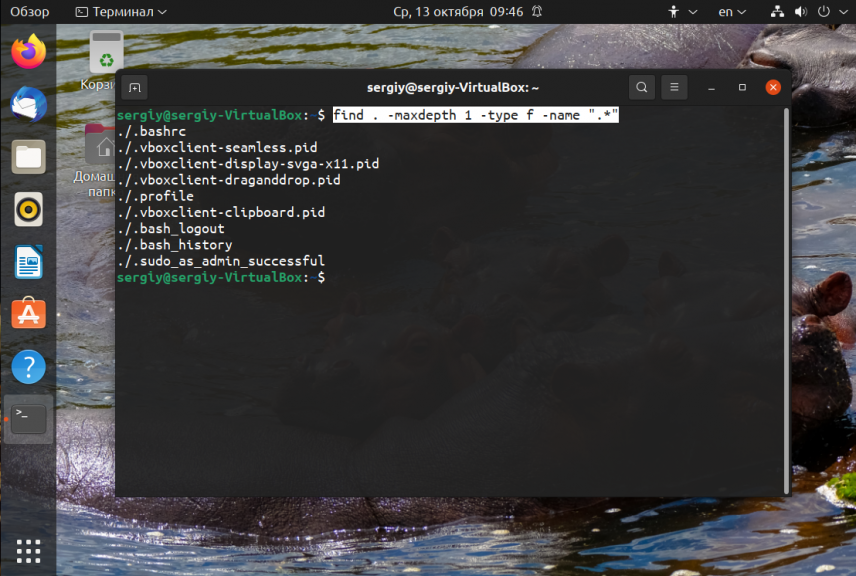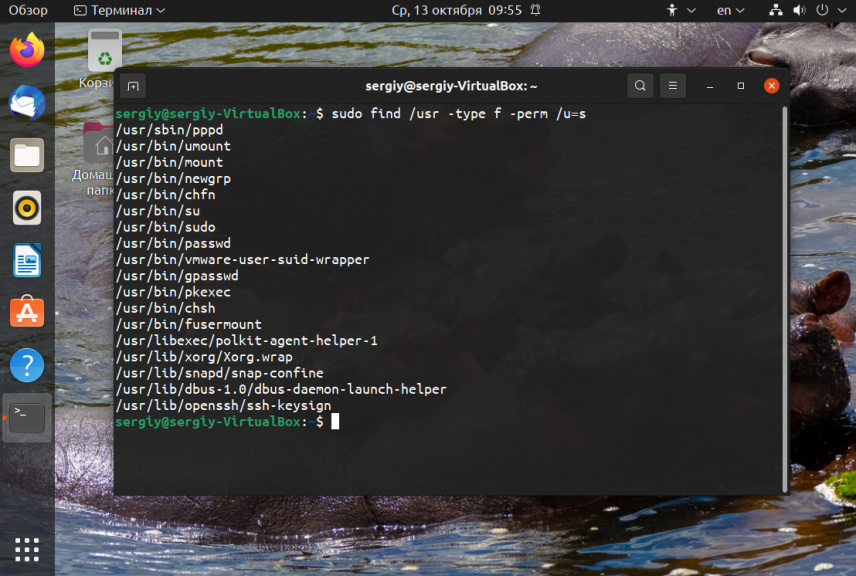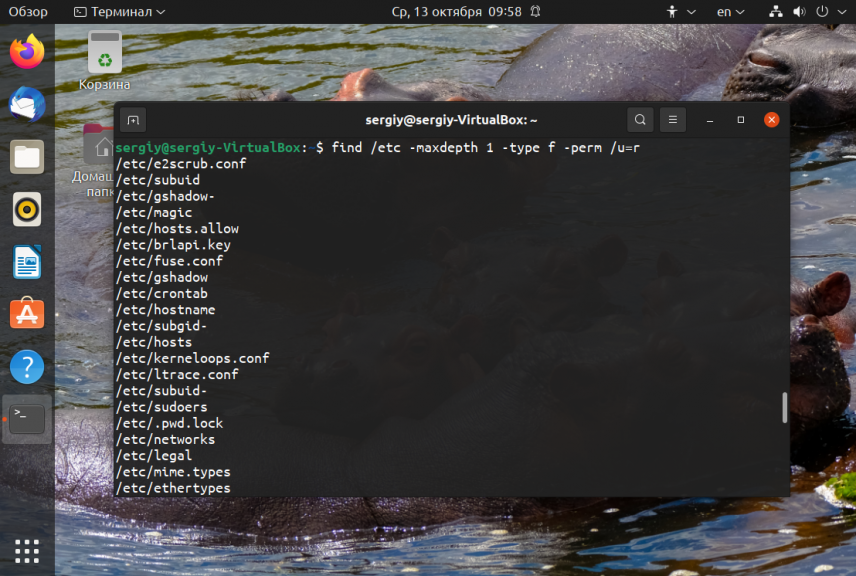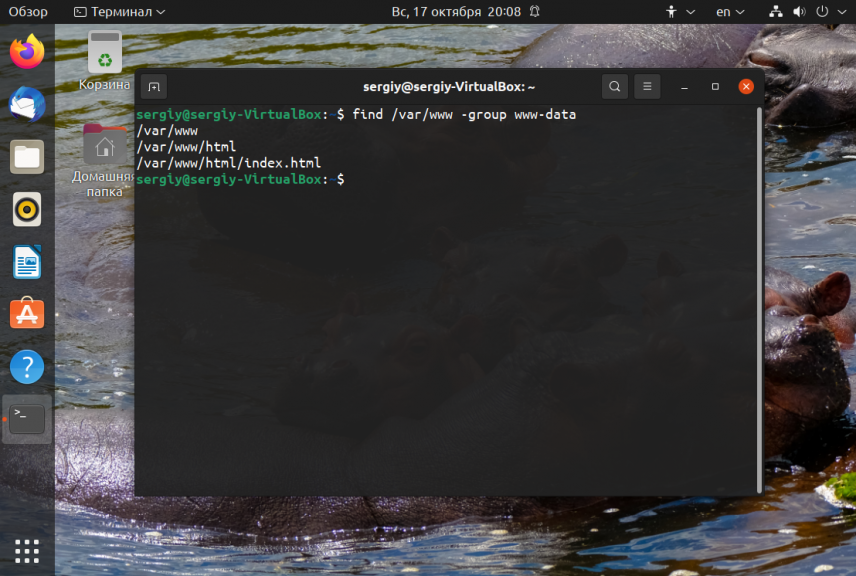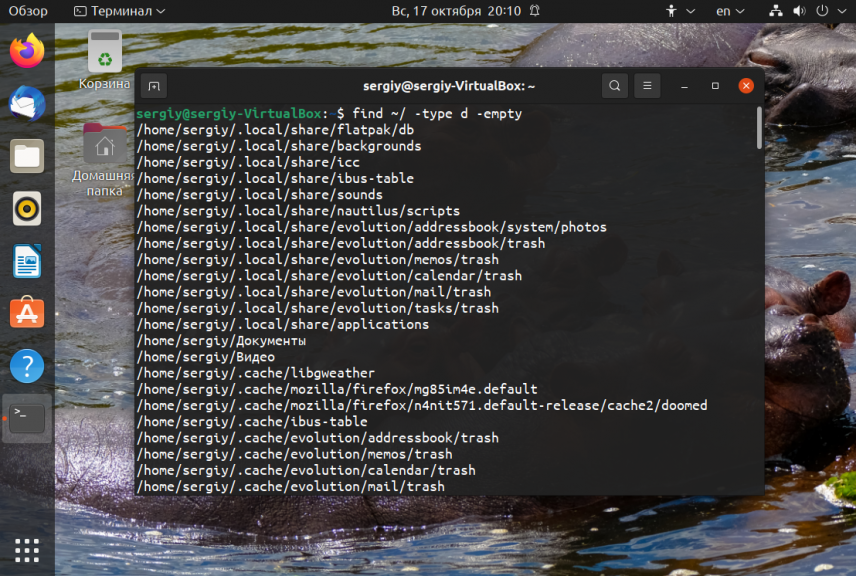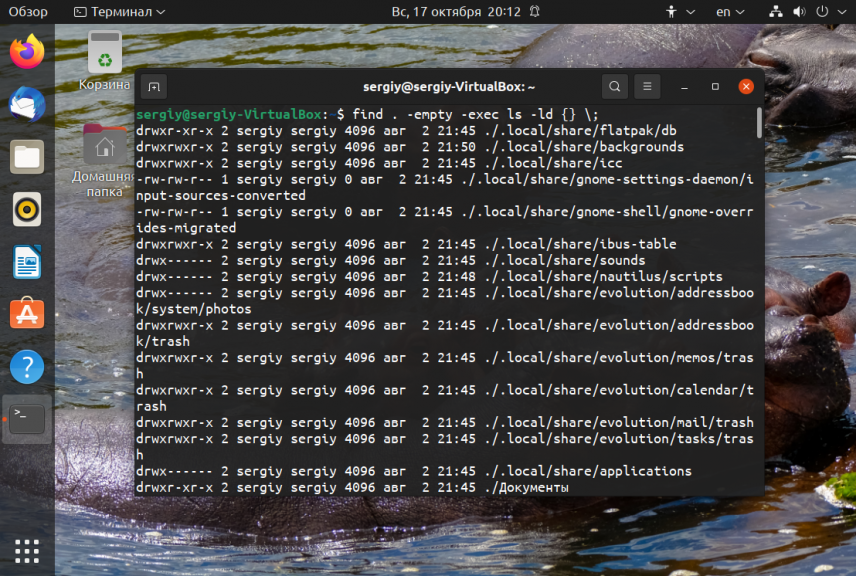- Команда find в Linux
- Основная информация о Find
- Основные параметры команды find
- Критерии
- Примеры использования
- 1. Поиск всех файлов
- 2. Поиск файлов в определенной папке
- 3. Ограничение глубины поиска
- 4. Инвертирование шаблона
- 5. Несколько критериев
- 6. Тип файла
- 6. Несколько каталогов
- 7. Поиск скрытых файлов
- 8. Поиск по разрешениям
- 9. Поиск файлов в группах и пользователях
- 10. Поиск по дате модификации
- 11. Поиск файлов по размеру
- 12. Поиск пустых файлов и папок
- 13. Действия с найденными файлами
- Выводы
- 35 Practical Examples of Linux Find Command
- 1. Find Files Using Name in Current Directory
- 2. Find Files Under Home Directory
- 3. Find Files Using Name and Ignoring Case
- 4. Find Directories Using Name
- 5. Find PHP Files Using Name
- 6. Find all PHP Files in the Directory
- 7. Find Files With 777 Permissions
- 8. Find Files Without 777 Permissions
- 9. Find SGID Files with 644 Permissions
- 10. Find Sticky Bit Files with 551 Permissions
- 11. Find SUID Files
- 12. Find SGID Files
- 13. Find Read-Only Files
- 14. Find Executable Files
- 15. Find Files with 777 Permissions and Chmod to 644
- 16. Find Directories with 777 Permissions and Chmod to 755
- 17. Find and remove single File
- 18. Find and remove Multiple File
- 19. Find all Empty Files
- 20. Find all Empty Directories
- 21. File all Hidden Files
- 22. Find Single File Based on User
- 23. Find all Files Based on User
- 24. Find all Files Based on Group
- 25. Find Particular Files of User
- 26. Find Last 50 Days Modified Files
- 27. Find Last 50 Days Accessed Files
- 28. Find Last 50-100 Days Modified Files
- 29. Find Changed Files in Last 1 Hour
- 30. Find Modified Files in Last 1 Hour
- 31. Find Accessed Files in Last 1 Hour
- 32. Find 50MB Files
- 33. Find Size between 50MB – 100MB
- 34. Find and Delete 100MB Files
- 35. Find Specific Files and Delete
Команда find в Linux
Очень важно уметь вовремя найти нужную информацию в системе. Конечно, все современные файловые менеджеры предлагают отличные функции поиска, но им не сравнится с поиском в терминале Linux. Он намного эффективнее и гибче обычного поиска, вы можете искать файлы не только по имени, но и по дате добавления, содержимому, а также использовать для поиска регулярные выражения.
Кроме того, с найденными файлами можно сразу же выполнять необходимые действия. В этой статье мы поговорим о поиске с помощью очень мощной команды find Linux, подробно разберем её синтаксис, опции и рассмотрим несколько примеров.
Основная информация о Find
Команда find — это одна из наиболее важных и часто используемых утилит системы Linux. Это команда для поиска файлов и каталогов на основе специальных условий. Ее можно использовать в различных обстоятельствах, например, для поиска файлов по разрешениям, владельцам, группам, типу, размеру и другим подобным критериям.
Утилита find предустановлена по умолчанию во всех Linux дистрибутивах, поэтому вам не нужно будет устанавливать никаких дополнительных пакетов. Это очень важная находка для тех, кто хочет использовать командную строку наиболее эффективно.
Команда find имеет такой синтаксис:
find [ папка] [ параметры] критерий шаблон [действие]
Папка — каталог в котором будем искать
Параметры — дополнительные параметры, например, глубина поиска, и т д
Критерий — по какому критерию будем искать: имя, дата создания, права, владелец и т д.
Шаблон — непосредственно значение по которому будем отбирать файлы.
Основные параметры команды find
Я не буду перечислять здесь все параметры, рассмотрим только самые полезные.
- -P — никогда не открывать символические ссылки.
- -L — получает информацию о файлах по символическим ссылкам. Важно для дальнейшей обработки, чтобы обрабатывалась не ссылка, а сам файл.
- -maxdepth — максимальная глубина поиска по подкаталогам, для поиска только в текущем каталоге установите 1.
- -depth — искать сначала в текущем каталоге, а потом в подкаталогах.
- -mount искать файлы только в этой файловой системе.
- -version — показать версию утилиты find.
- -print — выводить полные имена файлов.
- -type f — искать только файлы.
- -type d — поиск папки в Linux.
Критерии
Критериев у команды find в Linux очень много, и мы опять же рассмотрим только основные.
- -name — поиск файлов по имени.
- -perm — поиск файлов в Linux по режиму доступа.
- -user — поиск файлов по владельцу.
- -group — поиск по группе.
- -mtime — поиск по времени модификации файла.
- -atime — поиск файлов по дате последнего чтения.
- -nogroup — поиск файлов, не принадлежащих ни одной группе.
- -nouser — поиск файлов без владельцев.
- -newer — найти файлы новее чем указанный.
- -size — поиск файлов в Linux по их размеру.
Примеры использования
А теперь давайте рассмотрим примеры find, чтобы вы лучше поняли, как использовать эту утилиту.
1. Поиск всех файлов
Показать все файлы в текущей директории:
Все три команды покажут одинаковый результат. Точка здесь означает текущую папку. Вместо неё можно указать любую другую.
2. Поиск файлов в определенной папке
Показать все файлы в указанной директории:
Искать файлы по имени в текущей папке:
Поиск по имени в текущей папке:
Не учитывать регистр при поиске по имени:
3. Ограничение глубины поиска
Поиска файлов по имени в Linux только в этой папке:
find . -maxdepth 1 -name «*.php»
4. Инвертирование шаблона
Найти файлы, которые не соответствуют шаблону:
5. Несколько критериев
Поиск командой find в Linux по нескольким критериям, с оператором исключения:
find . -name «test» -not -name «*.php»
Найдет все файлы, начинающиеся на test, но без расширения php. А теперь рассмотрим оператор ИЛИ:
find -name «*.html» -o -name «*.php»
Эта команда найдёт как php, так и html файлы.
6. Тип файла
По умолчанию find ищет как каталоги, так и файлы. Если вам необходимо найти только каталоги используйте критерий type с параметром d. Например:
find . -type d -name «Загрузки»
Для поиска только файлов необходимо использовать параметр f:
find . -type f -name «Загрузки»
6. Несколько каталогов
Искать в двух каталогах одновременно:
find ./test ./test2 -type f -name «*.c»
7. Поиск скрытых файлов
Найти скрытые файлы только в текущей папке. Имена скрытых файлов в Linux начинаются с точки:
find . -maxdepth 1 -type f -name «.*»
8. Поиск по разрешениям
Найти файлы с определенной маской прав, например, 0664:
Права также можно задавать буквами для u (user) g (group) и o (other). Например, для того чтобы найти все файлы с установленным флагом Suid в каталоге /usr выполните:
sudo find /usr -type f -perm /u=s
Поиск файлов доступных владельцу только для чтения только в каталоге /etc:
find /etc -maxdepth 1 -perm /u=r
Найти только исполняемые файлы:
find /bin -maxdepth 2 -perm /a=x
9. Поиск файлов в группах и пользователях
Найти все файлы, принадлежащие пользователю:
Поиск файлов в Linux принадлежащих группе:
find /var/www -group www-data
10. Поиск по дате модификации
Поиск файлов по дате в Linux осуществляется с помощью параметра mtime. Найти все файлы модифицированные 50 дней назад:
Поиск файлов в Linux открытых N дней назад:
Найти все файлы, модифицированные между 50 и 100 дней назад:
Найти файлы измененные в течении часа:
11. Поиск файлов по размеру
Найти все файлы размером 50 мегабайт:
От пятидесяти до ста мегабайт:
Найти самые маленькие файлы:
find . -type f -exec ls -s <> \; | sort -n -r | head -5
find . -type f -exec ls -s <> \; | sort -n | head -5
12. Поиск пустых файлов и папок
13. Действия с найденными файлами
Для выполнения произвольных команд для найденных файлов используется опция -exec. Например, для того чтобы найти все пустые папки и файлы, а затем выполнить ls для получения подробной информации о каждом файле используйте:
Удалить все текстовые файлы в tmp
find /tmp -type f -name «*.txt» -exec rm -f <> \;
Удалить все файлы больше 100 мегабайт:
find /home/bob/dir -type f -name *.log -size +100M -exec rm -f <> \;
Выводы
Вот и подошла к концу эта небольшая статья, в которой была рассмотрена команда find. Как видите, это одна из наиболее важных команд терминала Linux, позволяющая очень легко получить список нужных файлов. Ее желательно знать всем системным администраторам. Если вам нужно искать именно по содержимому файлов, то лучше использовать команду grep.
Обнаружили ошибку в тексте? Сообщите мне об этом. Выделите текст с ошибкой и нажмите Ctrl+Enter.
35 Practical Examples of Linux Find Command
The Linux find command is one of the most important and frequently used command command-line utility in Unix-like operating systems. The find command is used to search and locate the list of files and directories based on conditions you specify for files that match the arguments.
find command can be used in a variety of conditions like you can find files by permissions, users, groups, file types, date, size, and other possible criteria.
Through this article, we are sharing our day-to-day Linux find command experience and its usage in the form of examples.
In this article, we will show you the most used 35 Find Commands Examples in Linux. We have divided the section into Five parts from basic to advance usage of the find command.
- Part I: Basic Find Commands for Finding Files with Names
- Part II: Find Files Based on their Permissions
- Part III: Search Files Based On Owners and Groups
- Part IV: Find Files and Directories Based on Date and Time
- Part V: Find Files and Directories Based on Size
- Part VI: Find Multiple Filenames in Linux
1. Find Files Using Name in Current Directory
Find all the files whose name is tecmint.txt in a current working directory.
# find . -name tecmint.txt ./tecmint.txt
2. Find Files Under Home Directory
Find all the files under /home directory with the name tecmint.txt.
# find /home -name tecmint.txt /home/tecmint.txt
3. Find Files Using Name and Ignoring Case
Find all the files whose name is tecmint.txt and contains both capital and small letters in /home directory.
# find /home -iname tecmint.txt ./tecmint.txt ./Tecmint.txt
4. Find Directories Using Name
Find all directories whose name is Tecmint in / directory.
# find / -type d -name Tecmint /Tecmint
5. Find PHP Files Using Name
Find all php files whose name is tecmint.php in a current working directory.
# find . -type f -name tecmint.php ./tecmint.php
6. Find all PHP Files in the Directory
Find all php files in a directory.
# find . -type f -name "*.php" ./tecmint.php ./login.php ./index.php
7. Find Files With 777 Permissions
Find all the files whose permissions are 777.
# find . -type f -perm 0777 -print
8. Find Files Without 777 Permissions
Find all the files without permission 777.
# find / -type f ! -perm 777
9. Find SGID Files with 644 Permissions
Find all the SGID bit files whose permissions are set to 644.
10. Find Sticky Bit Files with 551 Permissions
Find all the Sticky Bit set files whose permission is 551.
# find / -perm 1551
11. Find SUID Files
Find all SUID set files.
# find / -perm /u=s
12. Find SGID Files
Find all SGID set files.
# find / -perm /g=s
13. Find Read-Only Files
Find all Read-Only files.
# find / -perm /u=r
14. Find Executable Files
Find all Executable files.
# find / -perm /a=x
15. Find Files with 777 Permissions and Chmod to 644
Find all 777 permission files and use the chmod command to set permissions to 644.
# find / -type f -perm 0777 -print -exec chmod 644 <> \;
16. Find Directories with 777 Permissions and Chmod to 755
Find all 777 permission directories and use the chmod command to set permissions to 755.
# find / -type d -perm 777 -print -exec chmod 755 <> \;
17. Find and remove single File
To find a single file called tecmint.txt and remove it.
# find . -type f -name "tecmint.txt" -exec rm -f <> \;
18. Find and remove Multiple File
To find and remove multiple files such as .mp3 or .txt, then use.
# find . -type f -name "*.txt" -exec rm -f <> \; OR # find . -type f -name "*.mp3" -exec rm -f <> \;
19. Find all Empty Files
To find all empty files under a certain path.
# find /tmp -type f -empty
20. Find all Empty Directories
To file all empty directories under a certain path.
# find /tmp -type d -empty
21. File all Hidden Files
To find all hidden files, use the below command.
# find /tmp -type f -name ".*"
22. Find Single File Based on User
To find all or single files called tecmint.txt under / root directory of owner root.
# find / -user root -name tecmint.txt
23. Find all Files Based on User
To find all files that belong to user Tecmint under /home directory.
# find /home -user tecmint
24. Find all Files Based on Group
To find all files that belong to the group Developer under /home directory.
# find /home -group developer
25. Find Particular Files of User
To find all .txt files of user Tecmint under /home directory.
# find /home -user tecmint -iname "*.txt"
26. Find Last 50 Days Modified Files
To find all the files which are modified 50 days back.
# find / -mtime 50
27. Find Last 50 Days Accessed Files
To find all the files which are accessed 50 days back.
# find / -atime 50
28. Find Last 50-100 Days Modified Files
To find all the files which are modified more than 50 days back and less than 100 days.
# find / -mtime +50 –mtime -100
29. Find Changed Files in Last 1 Hour
To find all the files which are changed in the last 1 hour.
# find / -cmin -60
30. Find Modified Files in Last 1 Hour
To find all the files which are modified in the last 1 hour.
# find / -mmin -60
31. Find Accessed Files in Last 1 Hour
To find all the files which are accessed in the last 1 hour.
# find / -amin -60
32. Find 50MB Files
To find all 50MB files, use.
# find / -size 50M
33. Find Size between 50MB – 100MB
To find all the files which are greater than 50MB and less than 100MB.
# find / -size +50M -size -100M
34. Find and Delete 100MB Files
To find all 100MB files and delete them using one single command.
# find / -type f -size +100M -exec rm -f <> \;
35. Find Specific Files and Delete
Find all .mp3 files with more than 10MB and delete them using one single command.
# find / -type f -name *.mp3 -size +10M -exec rm <> \;
That’s it, We are ending this post here, In our next article, we will discuss more other Linux commands in-depth with practical examples. Let us know your opinions on this article using our comment section.
